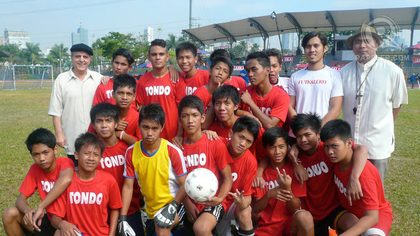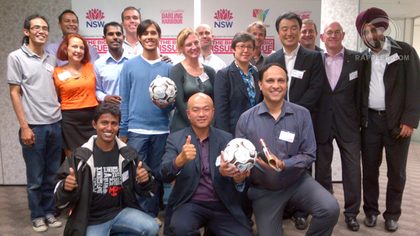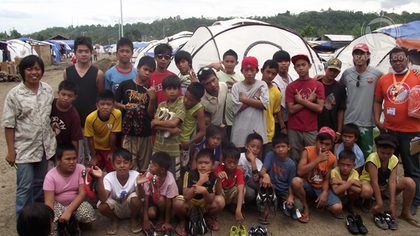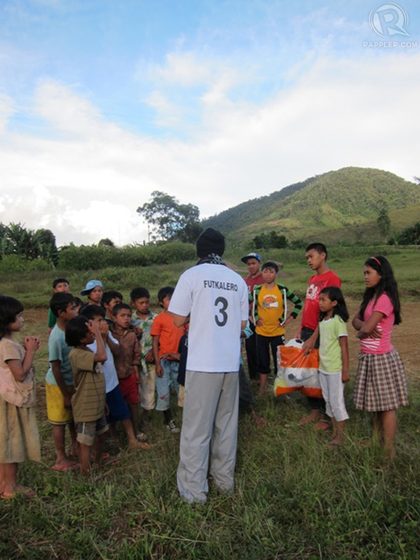SUMMARY
This is AI generated summarization, which may have errors. For context, always refer to the full article.

MANILA, Philippines – Anyone can play football, FutKal founder Peter Amores insists.
In fact, even before the Azkals grabbed our attention and made us pay attention to the sport, the Philippines has had a long history with football — as early as the 1920s.
For Peter Amores, football — which began as a way to differentiate himself from basketball-playing batchmates — has defined his life. When Peter left the sport to join the corporate world, football called him back. Insistently.
Peter finally answered the call, but this time as a mentor and with a new organization: FutKal.
In 2006, he started partnering with organizations to see how marginalized children will react to a football program. In 2008, they formally adopted a community in Tondo, with the help of film director Jim Libiran for the independent film, “Happyland.”
FutKal — football + kalye (street) — is a non-profit organization that promotes the sport at grassroots levels, as a recreational option, as a medium for motivation and as source of pride. Through clinics, camps, tournaments and other activities, Peter and his team of volunteers use football to instill discipline, teamwork, collaboration and creativity to enhance the Filipino’s potential in sports — and in life.
We catch up with Peter to learn more about this calling and mission.

How has football played a role in your life?
“Up until college, football was all about winning. One of my highlights was being part of the National Team that went to Europe to play in various tournaments representing our country, an experience that made me a better player and person.
“In college, I played for De La Salle University, thanks to my disciplinarian coach, Hans Peter Smit, who offered me an educational scholarship and molded me to become a more complete player. At this stage, winning was not an option — it was the only direction.
“After college, I played for Kaya FC with my former teammates and fellow alumni. After winning almost all major tournaments in the country, I decided after a couple of years to leave competitive football and join a recreational club, Union FC, where it was really more about the camaraderie, having fun enjoying the game, win or lose.”
How is football a good match for the Filipino?
“The fact that the ball is on the ground, height is not a major factor.
“Filipinos are known to be very crafty, agile and creative; the three most crucial ingredients, the ‘holy trinity’ of football player and they come without a price for us. Majority of Filipinos are naturally gifted with foot coordination. Our local recreational sports (ie habulan, patintero, pico, Chinese garter) also help develop a kid’s psycho-motor skills.
“We have an undeniable fighting spirit. Warriors at heart, we will fight for what we stand for as a team.”
What is the general idea behind FutKal?
“To provide an alternative way to educate about and provide training in football in poverty-stricken areas, using the sport as a tool for social change. For instance, since there aren’t a lot of football fields available, we make use of alternative venues like basketball courts and parking lots.
“The vision is to help uplift lives and inject discipline in order to reach personal goals and live healthier lives.
“In 2007, I joined the Philippine national Futsal team that played in Thailand for the SEA Games. It gave me the motivation to continue FutKal, seeing a lot of players having fun, playing the game in open parks, abandoned streets and practically anywhere. I said to myself: This is what the Philippines is missing.”

How does FutKal help the children in the program?
“(With FutKal), the kids have an opportunity to get scholarships and a chance to be employed in the future.
“When we first talked to them, they had no hopes, no dreams. For them, they were born in Tondo, they will die there. Their only aspirations were to become a labandero (laundry person), a pedicab driver — very small (dreams).
“I was thinking, ‘You don’t need to follow the footsteps of your parents, you can go higher than that.’ With football, we try to take away the chains that hold them back. Just like in football, there are so many opportunities out there, but we have to work together.”
What are your biggest achievements, so far?
“All of our kids now are enrolled in school because they’re all motivated. Now they’re proud to be Futkaleros; they all have a family where they know they’re safe, may kakampi sila (they have people on their side). Their lives are now open to possibilities. They have more confidence, higher self-esteem, are being valued in their family and community. They are more positive and disciplined.
“This coming school year, 5 of our kids are taking entrance exams at prestigious universities.
“One of our students, Rocel Maria Mendano, has been chosen as part of the national team’s under-12 division, which will be playing in Vietnam. One of our seniors, Dennis Balbin, is regarded as the best football freestyler in the Philippines. In 2010 at the Streetchild World Cup in South Africa, Roberto Orlandrez, a futkalero, was part of the Philippine team.
“A lot of our senior students are able to travel around the country teaching the younger generations, sharing their talents, motivating them to play sports.”
Since your beginnings in Tondo, have you adopted other communities?
“With the help of private individuals and organizational grants, we have been able to expand FutKal around the country — two more locations in Tondo, one in Cagayan De Oro, one in Aklan.”

What’s next for FutKal?
“I just arrived from Sydney, Australia, from a football conference and workshop that focused on ‘development through football.’
Right now, FutKal is creating a 10-year Youth Football Exchange Program for Asia, partnering with the Asian Football Confederation and Streetfootballworld (world’s largest football NGO).
“We are hoping to create programs that will increase the awareness in promoting football as a tool for social development all over the continent.” – Rappler.com
(Learn more aboutFutKal or Futbol sa Kalye at https://www.facebook.com/futkal.)
Add a comment
How does this make you feel?
There are no comments yet. Add your comment to start the conversation.